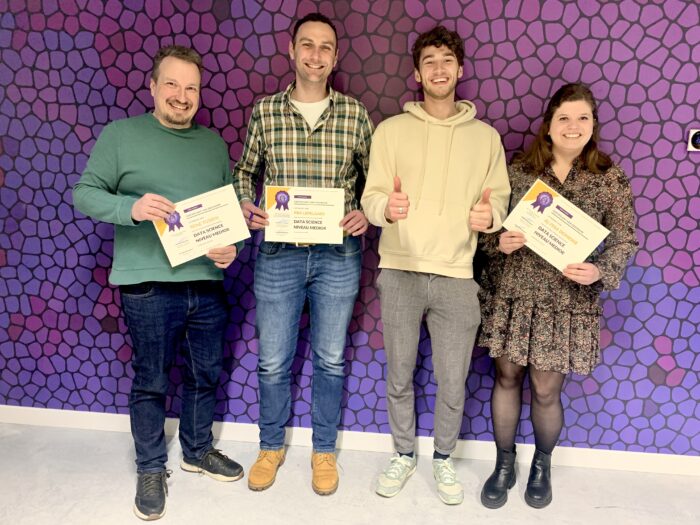
For 14 weeks, three students from Sligro Food Group participated in the ‘Data Science Medior’ track of the Pipple Academy. In this track, the students have taken their Data Science knowledge to a higher level. It focused on topics that a Medior Data Scientist usually has to deal with; from applying existing models to your own data sets, to modular and production-worthy programming.
As with every Pipple training, the exact content of each lecture was tailored to the level of the students, and adjusted based on relevant use cases at Sligro Food Group. Through flexibility in the training program, we strive for an optimal result for company and student.
But perhaps most importantly; What did students think?
What did you think of the training?
For me, the training was super valuable. I had personally already taken some steps on this subject, but to be able to broaden and deepen it further, this was certainly an interesting training for me.
In addition, it is good that you are immediately instructed to think about a use case that plays a role in your own company. That makes it immediately concrete for everyone, and makes you think about the use case itself. You work with data that you recognize, and see the stubbornness of it. This forces you to think about the applicability within your company: ‘If we want this, then this must be arranged.’
What skills did you learn?
At least object-oriented programming. That you think carefully about the structure of your code, capturing your code in defined functions, and a clear structure. In addition, working with Pycharm is very convenient. You are forced to document your code well, making your code much more valuable and reusable. Force yourself into code conventions and try to deal with them as best you can. The process of version control using Github has also taught me a lot. This way I know how to use existing methods to improve my way of working.
I also learned a lot about making your code production-ready. First I worked purely functionally, ‘I do this now, then I do that’. But in lesson 1 we started with ‘we’re going to refactor.’ Then I thought ‘what does that mean?’ Now I always try to apply it. Do I have to do this more than twice? Then I have to do something with it. I try to think in advance ‘I have to do this more often, so make it reproducible.’
In addition, of course, the substantive data science knowledge, such as the use of different data sets, the application of normalization and how to apply clustering models.
How do the skills learned contribute to your organizational goals?
Sligro Food Group has expressed the ambition to work more data-driven. Within Sligro Food Group we have a theme every year. This year it is ‘Smarter Together’, and part of that is ‘Smarter Together with Data’. This shows that the data ambition is there, and that it is therefore also on the agenda of senior management. Data is not our core business, but it is at the center of the organization, and therefore it is wise that people are fully equipped to deal with Data Science. That is why it will certainly contribute that we have followed this course.
Result
In the training, the students have made great strides in the field of Data Science and programming. They are aware of how they write sustainable code, and how they train a model on their own use case. The developed material is reused within their own work and continues to be developed.
What the students themselves say about the trainer: “The Pipple trainer knows what he is talking about and knows how to convey that. Letting students do the controls themselves is very good. In addition, there is also repetition in it which also helps to really master things. There was also time for a joke or some Sligro-specific matters between us. All in all, I found it very fun and educational to participate in this course.”
Since completing the training, the trainer and students still have periodic contact about the work. For example, the trainer has an advisory and thinking role to ensure that what has been learned can be applied as well as possible in practice.

